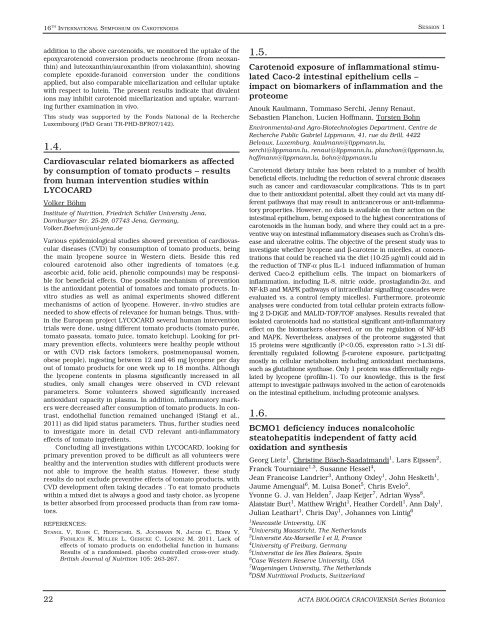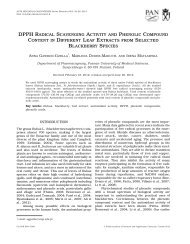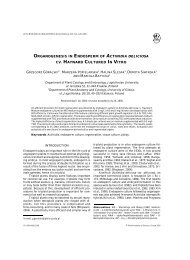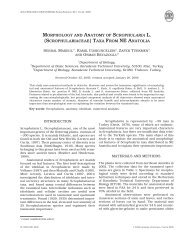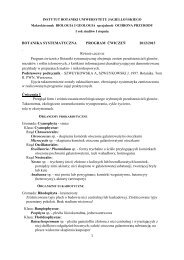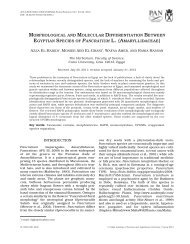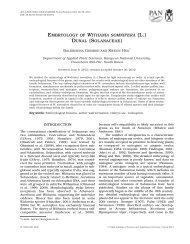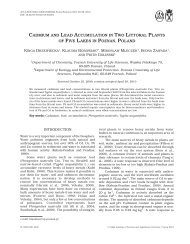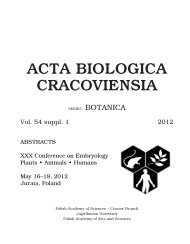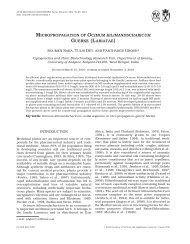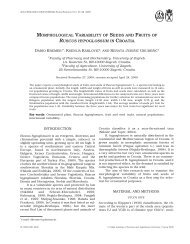ACTA BIOLOGICA CRACOVIENSIA
ACTA BIOLOGICA CRACOVIENSIA
ACTA BIOLOGICA CRACOVIENSIA
Create successful ePaper yourself
Turn your PDF publications into a flip-book with our unique Google optimized e-Paper software.
16 TH INTERNATIONAL SYMPOSIUM ON CAROTENOIDS<br />
addition to the above carotenoids, we monitored the uptake of the<br />
epoxycarotenoid conversion products neochrome (from neoxanthin)<br />
and luteoxanthin/auroxanthin (from violaxanthin), showing<br />
complete epoxide-furanoid conversion under the conditions<br />
applied, but also comparable micellarization and cellular uptake<br />
with respect to lutein. The present results indicate that divalent<br />
ions may inhibit carotenoid micellarization and uptake, warranting<br />
further examination in vivo.<br />
This study was supported by the Fonds National de la Recherche<br />
Luxembourg (PhD Grant TR-PHD-BFR07/142).<br />
1.4.<br />
Cardiovascular related biomarkers as affected<br />
by consumption of tomato products – results<br />
from human intervention studies within<br />
LYCOCARD<br />
Volker Böhm<br />
Institute of Nutrition, Friedrich Schiller University Jena,<br />
Dornburger Str. 25-29, 07743 Jena, Germany,<br />
Volker.Boehm@uni-jena.de<br />
Various epidemiological studies showed prevention of cardiovascular<br />
diseases (CVD) by consumption of tomato products, being<br />
the main lycopene source in Western diets. Beside this red<br />
coloured carotenoid also other ingredients of tomatoes (e.g.<br />
ascorbic acid, folic acid, phenolic compounds) may be responsible<br />
for beneficial effects. One possible mechanism of prevention<br />
is the antioxidant potential of tomatoes and tomato products. Invitro<br />
studies as well as animal experiments showed different<br />
mechanisms of action of lycopene. However, in-vivo studies are<br />
needed to show effects of relevance for human beings. Thus, within<br />
the European project LYCOCARD several human intervention<br />
trials were done, using different tomato products (tomato purée,<br />
tomato passata, tomato juice, tomato ketchup). Looking for primary<br />
prevention effects, volunteers were healthy people without<br />
or with CVD risk factors (smokers, postmenopausal women,<br />
obese people), ingesting between 12 and 46 mg lycopene per day<br />
out of tomato products for one week up to 18 months. Although<br />
the lycopene contents in plasma significantly increased in all<br />
studies, only small changes were observed in CVD relevant<br />
parameters. Some volunteers showed significantly increased<br />
antioxidant capacity in plasma. In addition, inflammatory markers<br />
were decreased after consumption of tomato products. In contrast,<br />
endothelial function remained unchanged (Stangl et al.,<br />
2011) as did lipid status parameters. Thus, further studies need<br />
to investigate more in detail CVD relevant anti-inflammatory<br />
effects of tomato ingredients.<br />
Concluding all investigations within LYCOCARD, looking for<br />
primary prevention proved to be difficult as all volunteers were<br />
healthy and the intervention studies with different products were<br />
not able to improve the health status. However, these study<br />
results do not exclude preventive effects of tomato products, with<br />
CVD development often taking decades . To eat tomato products<br />
within a mixed diet is always a good and tasty choice, as lycopene<br />
is better absorbed from processed products than from raw tomatoes.<br />
REFERENCES:<br />
STANGL V, KUHN C, HENTSCHEL S, JOCHMANN N, JACOB C, BÖHM V,<br />
FRÖHLICH K, MÜLLER L, GERICKE C, LORENZ M. 2011. Lack of<br />
effects of tomato products on endothelial function in humans:<br />
Results of a randomised, placebo controlled cross-over study.<br />
British Journal of Nutrition 105: 263-267.<br />
1.5.<br />
Carotenoid exposure of inflammational stimulated<br />
Caco-2 intestinal epithelium cells –<br />
impact on biomarkers of inflammation and the<br />
proteome<br />
Anouk Kaulmann, Tommaso Serchi, Jenny Renaut,<br />
Sebastien Planchon, Lucien Hoffmann, Torsten Bohn<br />
Environmental-and Agro-Biotechnologies Department, Centre de<br />
Recherche Public Gabriel Lippmann, 41, rue du Brill, 4422<br />
Belvaux, Luxemburg. kaulmann@lippmann.lu,<br />
serchi@lippmann.lu, renaut@lippmann.lu, planchon@lippmann.lu,<br />
hoffmann@lippmann.lu, bohn@lippmann.lu<br />
Carotenoid dietary intake has been related to a number of health<br />
beneficial effects, including the reduction of several chronic diseases<br />
such as cancer and cardiovascular complications. This is in part<br />
due to their antioxidant potential, albeit they could act via many different<br />
pathways that may result in anticancerous or anti-inflammatory<br />
properties. However, no data is available on their action on the<br />
intestinal epithelium, being exposed to the highest concentrations of<br />
carotenoids in the human body, and where they could act in a preventive<br />
way on intestinal inflammatory diseases such as Crohn's disease<br />
and ulcerative colitis. The objective of the present study was to<br />
investigate whether lycopene and β-carotene in micelles, at concentrations<br />
that could be reached via the diet (10-25 μg/ml) could aid in<br />
the reduction of TNF-α plus IL-1 induced inflammation of human<br />
derived Caco-2 epithelium cells. The impact on biomarkers of<br />
inflammation, including IL-8, nitric oxide, prostaglandin-2α, and<br />
NF-kB and MAPK pathways of intracellular signalling cascades were<br />
evaluated vs. a control (empty micelles). Furthermore, proteomic<br />
analyses were conducted from total cellular protein extracts following<br />
2 D-DiGE and MALID-TOF/TOF analyses. Results revealed that<br />
isolated carotenoids had no statistical significant anti-inflammatory<br />
effect on the biomarkers observed, or on the regulation of NF-kB<br />
and MAPK. Nevertheless, analyses of the proteome suggested that<br />
15 proteins were significantly (P1.3) differentially<br />
regulated following β-carotene exposure, participating<br />
mostly in cellular metabolism including antioxidant mechanisms,<br />
such as glutathione synthase. Only 1 protein was differentially regulated<br />
by lycopene (profilin-1). To our knowledge, this is the first<br />
attempt to investigate pathways involved in the action of carotenoids<br />
on the intestinal epithelium, including proteomic analyses.<br />
1.6.<br />
BCMO1 deficiency induces nonalcoholic<br />
steatohepatitis independent of fatty acid<br />
oxidation and synthesis<br />
SESSION 1<br />
Georg Lietz1 , Christine Bösch-Saadatmandi1 , Lars Eijssen2 ,<br />
Franck Tourniaire1,3 , Susanne Hessel4 ,<br />
Jean Francoise Landrier3 , Anthony Oxley1 , John Hesketh1 ,<br />
Jaume Amengual6 , M. Luisa Bonet5 , Chris Evelo2 ,<br />
Yvonne G. J. van Helden7 , Jaap Keijer7 , Adrian Wyss8 ,<br />
Alaistair Burt1 , Matthew Wright1 , Heather Cordell1 , Ann Daly1 ,<br />
Julian Leathart1 , Chris Day1 , Johannes von Lintig6 1Newcastle University, UK<br />
2University Maastricht, The Netherlands<br />
3Université Aix-Marseille I et II, France<br />
4University of Freiburg, Germany<br />
5Universitat de les Illes Balears, Spain<br />
6Case Western Reserve University, USA<br />
7Wageningen University, The Netherlands<br />
8DSM Nutritional Products, Switzerland<br />
22 <strong>ACTA</strong> <strong>BIOLOGICA</strong> <strong>CRACOVIENSIA</strong> Series Botanica


